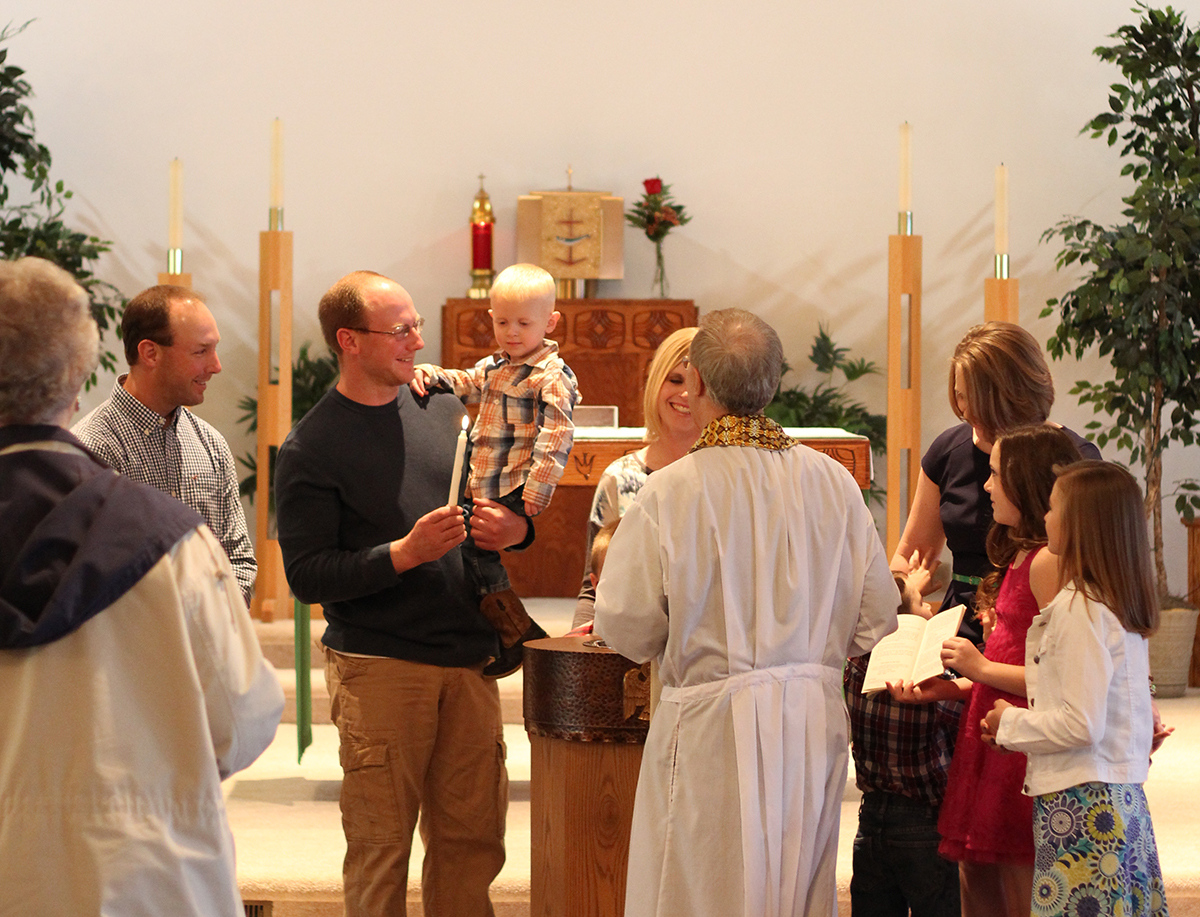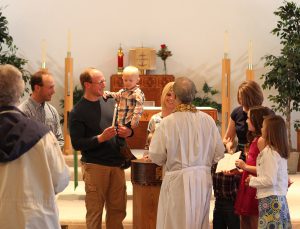
By Renae Kranz
It’s no secret our culture has been moving away from Christian values for decades now, and that move to a more secular world with no need for religion or God seems to be picking up speed. In this environment, Catholic parents worry their children will grow up and walk away from their faith—and they often feel powerless to stop it.
What many parents forget is the real influence they have over how their children see and embrace their relationship with God and how well they learn their faith. And if parents don’t use that influence to help deeply ingrain their children’s faith in their hearts, our culture will sweep them into its secular current.
Father Shaun Haggerty says parents are the key to passing on the Catholic faith to their children, especially in times like these. They will have to be the primary teachers.
“It’s a little intimidating for them to be the teachers, but that’s really what’s going to have to happen if the kids are going to keep the faith in the future,” Father Haggerty says, “because it’s going to become so counter-cultural [to be Catholic] that unless the parents are really teaching them, then they won’t remain Catholic.”
That can feel like a heavy burden, but parents are already equipped to teach their children how to love God and receive his love—and it begins with their own love and example.
The family reflects the Trinity
 The Catechism of the Catholic Church (CCC) has an entire section entitled “The Family in God’s Plan” that lays out how families play a significant role in the salvation of mankind. It begins by explaining how the family reflects the Trinity:
The Catechism of the Catholic Church (CCC) has an entire section entitled “The Family in God’s Plan” that lays out how families play a significant role in the salvation of mankind. It begins by explaining how the family reflects the Trinity:
“The Christian family is a communion of persons, a sign and image of the communion of the Father and the Son in the Holy Spirit. In the procreation and education of children it reflects the Father’s work of creation. It is called to partake of the prayer and sacrifice of Christ. Daily prayer and the reading of the Word of God strengthen it in charity. The Christian family has an evangelizing and missionary task.” (CCC 2205)
When read closely, this passage from the catechism lays out everything parents need to do to teach their children the faith: prayer, sacrifice and attention to the Word of God. If the Christian family is to be missionary, parents must embrace the task of evangelizing their own children first. The catechism continues:
“Parents have the first responsibility for the education of their children. They bear witness to this responsibility first by creating a home where tenderness, forgiveness, respect, fidelity, and disinterested service are the rule. The home is well suited for education in the virtues. This requires an apprenticeship in self-denial, sound judgment, and self-mastery—the preconditions of all true freedom. Parents should teach their children to subordinate the “material and instinctual dimensions to interior and spiritual ones.” Parents have a grave responsibility to give good example to their children. By knowing how to acknowledge their own failings to their children, parents will be better able to guide and correct them …” (CCC 2223)
The Church squarely puts the responsibility of passing on the faith to children on their parents. By creating a home “where tenderness, forgiveness, respect, fidelity and disinterested service” prevail, children learn by the example of their parents. You don’t have to be a theologian to pass on the faith, but you do have to recognize that it’s your responsibility first.
“I think a lot of times our parents are so used to delegating things out,” Father Haggerty says. “That’s the responsibility that parents really need to think about very carefully before they delegate that responsibility out to others, of teaching their children. It’s all vitally important; it’s really almost irreplaceable. It’s hard to get anyone better than parents [to teach the faith].”
Father Haggerty explains that delegating education of children to third parties wasn’t always the way things were done. It’s a product of the Industrial Revolution, and not necessarily a good one. Today, with both parents often working, it may seem impossible to have the time needed to pass on the Catholic faith, but it’s actually much simpler than we think.
Parents can start by living a life of love and service to their family and to their parish.
Religious ed alone isn’t enough
Don’t misunderstand, sending your kids to CCD or religious education classes is a necessary part of passing on your Catholic faith. But it isn’t the only part, or even the most important. The model of Mass on Sunday and CCD on Wednesday worked when Christianity was the dominant cultural influence (a “Christendom world”), but we no longer live in that world. It just isn’t enough exposure for kids learning the faith to be engaged with it only two hours a week according to Father Haggerty. We are living in a world that is becoming more missionary.

“If the culture is not Christian itself, then we ourselves need to be living it out even more because the culture in which we find ourselves is not assisting us at all in raising up faithful kids,” Father Haggerty says. “And so just dropping off [kids] at CCD was good because that wasn’t the only place they were getting it; it permeated the culture in a large way. But now the culture is becoming more and more unchristian and that certainly is not going to be enough.”
Father Haggerty, pastor at St. Lambert Parish in Sioux Falls, says many parishes involve parents in religious education, including his own parish. One way a parish might do that is to bring parents in once a month for a faith lesson so they can then go back home feeling confident enough to teach their kids several aspects of what they themselves learned.
Another method encourages a Christian environment within the parish through activities and community nights that bring families together to help them raise up their kids in the faith. It helps parents feel a sense of community and support for something that can otherwise feel intimidating.
The real key for parishes is to help parents realize their immense importance in passing on the faith and empower them to do so.
“Sometimes they don’t really realize how potent or how much it really sticks in the kids’ minds when Mom or Dad teach it and they may think, ‘Oh, I don’t know. I feel inadequate to teach.’ And then they automatically figure they can’t teach,” Father Haggerty says. “Now they’re being asked to teach the faith and a lot of it is revelatory for them. And you may not think they really want to listen to you, but it’s so impactful when you, as a parent, do that.”
Former DRE (director of religious education) Teresa Townsend, parishioner at St. Mary Parish in Sioux Falls, has experienced teaching kids the faith from both perspectives. She knows that what she helped teach at CCD and confirmation classes is valuable, but the likelihood of her students remaining Catholic as they get older is much greater if there is follow-up at home. Parents are a huge part of drawing them into the love of God.
“Unless it is lived at home, I just think there’s a disconnect,” Teresa says. “And it’s harder for that child to be grounded in the faith if they don’t have that backup from home.”
Teaching by example
Miriam and Ed O’Connor, parishioners at Holy Spirit Parish in Sioux Falls, knew they would need more than just sending their kids to CCD and attending Sunday Mass to teach them the Catholic faith and about the love of God. When the kids were little, they started out with prayers at meal times and before bed. As they got older, more was needed to move the needle.
The O’Connor’s are a great example of how what a parent does, not just says, can have a tremendous impact on their children. Over the years of raising their seven children, Mass was always a priority, no matter where they were. Even on vacation they would pack up the camper and head off to Mass or find a place to go to Mass while on the road. It was never even a question.

Ed and Miriam knew from their own experiences growing up that kids watch their parents to learn what to do and what not to do. Good or bad, they’re always soaking in what is happening around them.
“I feel like in our good things, we were teaching our kids what to do, and in our weaknesses, we were teaching our kids what not to do,” Miriam says. “And then the choice is up to you. You can either follow the weakest part or you can follow the strong part.”
Miriam is a self-described people person who loves to be of service to others. She taught CCD, helped with youth group, served funerals and generally stayed involved in her parish. She also made sure her kids went to youth rallies, D-camp and other offerings to help them get what they needed during their formative years. But her example made the real difference.
“I think that instead of preaching something, ‘you better do this, you better do that,’ they could just watch,” Miriam says. “By my example of serving, they could see that and doing it with love because I like doing it.”
One of the O’Connor’s daughters, Katie Weeder, now recognizes everything her mom did and showed her about how to live her faith.
“My mom did the best she could when it came to teaching or instilling the faith in us, and knew there was more,” Katie said. “So I feel like that’s why she made sure we attended everything offered by the Church. What we could go to together, we did. Once we went to college she encouraged us to attend the Newman Center, and that is where we really owned our Catholic faith as our own.”
You have to live it to give it
In her years working with catechists, Teresa always told them, “You can’t give what you don’t have.” She says that applies to parents as well and suggests you can start with a strong prayer life.
“You need to be embedded in the faith. You need to be dialed into the faith before you can pass it on to your kids,” Teresa says. “So praying with them, for them, just wrap yourself in prayer and then just be that example for them.”
Notice in her suggestion no words have been said yet. Start with prayer and then she says to start looking for what she calls “teachable moments” in your family life. Some examples of these moments would be when a child gets in trouble and you forgive them or showing them how to help a sibling with a chore. Teaching them love and service through family life and then being involved in parish life at the same time helps them make connections between everyday life and the love of God in the parish.
“You’re preparing them now for what they’re going to do in the future,” Teresa says. “You can’t just wait until second grade. You can’t wait until high school and then say, ‘okay, now we’re going to do this.’ It has to be part of your everyday life. You have to be consciously aware of it and hopefully they carry that through.”

Teresa and her husband Bill, parents of four children, always made sure they prayed as a family, lived the liturgical seasons and made Mass and parish activities a priority. Over the years she developed a habit of kissing her kids’ foreheads and giving them a blessing every night, something she heard at a conference. To this day, her grown children ask for that blessing before they leave when they’ve been visiting. It left a deep mark on them.
“I really do think it’s as simple as they just need to know that you love them and that God loves them and wants a relationship with them,” Teresa says.
Miriam’s approach has been similar to Teresa’s. She has always worked to make sure her kids understood God loves them. Her teaching at home often centered around 1 Corinthians 13:4 “love is patient, love is kind.” She says she sang it around the house all the time. As she got older, she connected the dots to realize God is love.
“I was always singing that song thinking, ‘Oh, God is patient God is kind.’ And so then that’s what we need to be,” Miriam says. “If you want to be a loving person, you need to be patient, you need to be kind.”
With her children, Miriam felt giving them support in exploring their faith was critical. She suggested a Search event to her daughter Meghan, telling her what a great experience she had when she went. After her daughter came back from Search, Miriam says she was just on fire. Later when she took her to SDSU for new student orientation, she made sure they went to the Newman Center and to Mass. She also took several of her girls to a Theology of the Body event in Minneapolis. She says they didn’t stop talking about it the entire drive home.
Miriam’s daughter Katie felt that support as well. She noticed her mother becoming more involved in her faith and learning more as she got older. She remembers her mom telling them about retreats, camps and mission trips and always encouraging them if they wanted to attend.
“Eventually, we took ownership and found these opportunities on our own,” Katie says. “When we would return home, we would discuss everything we learned and experienced. We were learning together. I remember her attending bible studies and retreats and it was modeled to me to continue to do that as I got older, not just something I did as a kid.”
Pray together, stay together
Father Haggerty says the one most important thing he emphasizes for families is the old saying “the family that prays together, stays together.” Letting your kids see you pray and also praying with them and teaching them how is the best way to help them develop their love for the Lord.
“Families that I know who do incorporate prayer together are much more together because the family unit is an image of the Trinity, and the Trinity is always in communion,” Father Haggerty says. “And when we ourselves are praying, we’re in communion with the Trinity. That enables us as a family to image that communion. We’re trying to live out what’s going on within God in our own families. And then if we as a family immerse ourselves in God, then we can live that reality in our own family life in a deeper way.”
Invite and teach your kids to pray. Teach them about the enormous love God has for them. You as parents have much more power than you might realize. Take it from the child of a parent who modeled it for her:
“If I could tell someone things they should do to try to instill the faith in their children, from what my mother did, it would be first to model as best as possible,” Katie says. “Next, when you feel like your child desires more but you don’t feel equipped, use outside sources: meeting with others like priests, mentors and other families you look up to. Have them attend youth group, camps, retreats and conferences, but do it together. Last, be encouraging and supportive. Don’t make them feel like it’s weird for wanting a deeper relationship with God.”
Once you’ve done all these things and shown them the love God has for them, Teresa says it’s time to give it over to God. She and Bill knew they had laid a good foundation and done the best they could with God’s help. They can still be there for their kids to answer questions and offer support, but the rest is mostly out of their hands.
“We obviously go to Mass and we pray and we do all those things when we’re together as a family, but they’re adults, you can’t force them,” Teresa says. “You can’t force them to do anything. And I do a lot of praying. That’s the best thing we can do.”
Father Haggerty’s sound advice can’t be said too many times.
“If you want your kids to turn out like Jesus so much so that they could act like Jesus, the family that prays together, stays together.”


